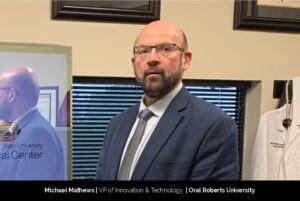Enabling Artificial Intelligence on a University Campus
Beyond’s Top Influential Educational Experts Making a Difference, 2020

Through an AI-Enabled
Mirror
The novelty and intrigue of Artificial Intelligence (AI)
makes it one of the most exciting, yet elusive technologies to make it an
exciting disrupter across all industries. Under careful examination, you will
find numerous industries who have innovatively enabled small pieces of AI.
These small and successful enabling aspects of AI into products and services
have given many companies and industries a very balanced approach into the
world of AI, without sacrificing their reputation with big transformations with
AI.
With higher education having a combined governance and
consensus model of decision making, AI enablement can be much more difficult to
implement. As we have seen over time, higher education will lag in most
technologies mainly due to this unique style of decision making. Unfortunately,
this inability to leverage AI enablement in higher education will be much more
visible, as industries continue to move forward. Consider the reality that
students today arrive on campus with automobiles that are AI enabled,
appliances that are AI enabled, and TV and electronics that are AI enabled. Over
the next decade, the ongoing AI enabled across industries will naturally produce
an expectation in the products, services and deliverables in higher education.
Considering few colleges or universities are big risk
takers, there appears to be two approaches to start enabling pieces of AI on a
campus. The first is to leverage small AI enhancements in areas that don’t require
complete campus-wide consensus. This would be in areas like auxiliary services
or information technologies. The second is to identify the top issues of
college campus leaders and determine if AI can assist.
The top issues identified by many campus leaders deal with
mental health; in some cases called student well-being. This top issue is once
again identified in a January, 2020 article by EducationDive,
called The President Speaks: 12 college
leaders, 12 ideas for higher education. This continue rising issue made
perfect sense to test a few AI enabled functions at Oral Roberts University. In
early 2019, Oral Roberts University started the process of creating a smart
mirror with AI enablement to address numerous campus challenges. After the
first few test and overwhelming reception, we decided to call it the MQ-Mirror.
The AI Enabled MQ-Mirror application has been designed at
Oral Roberts University to bring the power of IQ, EQ, and now MQ together via a
glass mirror. The mirror integrates a mini-processor, IoT, AI, digital
assistant and the entire university digital ecosystem. Students are able to
access all campus services and engage with the entire campus environment as a
life size digital assistant. The
MQ-Mirror was recently shown to colleges and universities from 22 European
countries, who all endorsed the break-through concept, including a new
partnership with the University of Latvia.
More importantly, the ability to program AI within the
MQ-Mirror, has created a test case to allow students to interact with the
mirror and test their level of mental health and well-being. Using natural
language programming, mirror coding language and the AI capabilities of Amazon
Alexa allow breakthroughs in creating an autonomous method to address mental
health in a special manner. In addition, the concept of nudging students takes
on a whole new meaning with the MQ-Mirror.

With a glass mirror capable of engaging and mirroring the human
actions with all the integrations of AI, machine learning, deep learning,
social media, online instruction, social skills, personal skills, wearables,
cameras, speech-to-text, etc. the mirror becomes ‘intelligent’ and fully
integrated with the human being. This new form-factor may slow down and even
reverse the new research proving that extensive engagement with Smartphones is
causing depression and anxiety.
The fascination with mirrors and ourselves has been around
for centuries. This fascination has caused many people to decry ‘vanity’ as
people spend endless hours envisioning who they are or who they could be — compared
to what they have imagined in their mind. In the year 2019 we are now capable
of seeing and expressing ourselves against all the worlds of known truths,
knowledge, intelligence, and data that allow interactions with people, people
groups, and solutions for education, beauty, wisdoms, and solutions for
addictions, etc.
Engaging a real human being that can visually and physically
interact with the entire virtual universe of knowledge, wisdom and truth has
endless possibilities. Just as the
smartphone form-factor transitioned the way humans digitally interact with a
computer, themselves, and each other; the Intelligent Mirror Reality will
visually and digitally transition the way the world of knowledge and society
engage. However, the focus will be on the human side versus the device side of
intelligence.
An individual will be able to wake up in the morning and interact with the MQ-Mirror and say ‘Alexa, what was my productivity yesterday?’ The digital assistant with Alexa AI will be able to report all personalized productivity items that the individual feels as productive or important; such as sleep patterns, fitness ratings, heart rate, 401K, monthly budget to date, tasks completed, and individual smartphone utilization – followed by suggested tips for the day. With the MQ-Mirror having the same mobile apps synced with the smartphone, the individual can tell Alexa to order their favorite Starbucks drink at the nearby Starbucks. The machine learning with the AI software will begin the journey of learning the nuances, likes, and dislikes of the individual in order to advance the engagements and suggestions – because technology should be about the person vs. the device. Students will be able to instantly ask and display all the student success factors that help them understand, navigate, and set daily and personal goals for their academic achievement.














